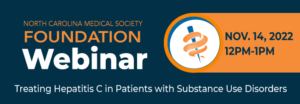
Register now for the webinar: “Treating Hepatitis C in Patients with Substance Use Disorders”
Rick Moore, MD, AAHIVS
Assistant Professor, UNC Family Medicine
NCDHHS Viral Hepatitis Medical Director
Monday, November 14, 2022
12:00 PM to 1:00 PM
We would like to invite you to a webinar, focusing on optimizing treatment of Hepatitis C in patients with active or recent substance use. It will focus on treatment strategies, examination of available data about safety and efficacy of treatment, and local and state initiatives to maximize care.
What: Treating Hepatitis C in Patients with Substance Use Disorders Webinar
When: November 14th from 12:00 pm – 1:00 pm
Who: Physicians, advanced practice providers, nurses, and healthcare staff involved in the care of people with substance use disorders.
Why: The aim of this webinar is to discuss rationale behind and strategies for achieving broader uptake of Hepatitis C treatment for patients with active or recent substance use. New Hepatitis C infections are highest in young adults, with the majority of these infections being tied to injection drug use. Available data in real world and study settings has demonstrated that treatment of Hepatitis C is safe and effective, and expansion of treatment in this setting stands to have a dramatic impact on individual and public health.
This webinar is free but you must be registered to attend.
Space is limited so register early!
After you register, you will receive an emailed confirmation with webinar and phone-in instructions.

Rick Moore, MD, AAHIVS
About Dr. Moore:
Richard (Rick) Moore II, MD, AAHIVS, obtained his medical degree from Virginia Commonwealth University. He then attended family medicine residency training at the Lawrence Family Medicine Residency in Massachusetts, where he underwent an integrated training track in care of patients with HIV and Hepatitis C. He worked for Rural Health Group from 2014-2019, a federally qualified health center in northeastern North Carolina, where he directed their HIV, viral hepatitis, and medication-assisted treatment programs and served as associate medical director. He continues to provide HIV and Hepatitis C care in this setting and to direct those programs. He helped develop the Carolina Hepatitis Academic Mentorship Program, which trains North Carolina providers in low-resource settings in Hepatitis C care delivery. He serves as the medical director for the North Carolina Department of Health and Human Services Viral Hepatitis Program, a role which he began in November 2020. He is an assistant professor for the University of North Carolina’s Department of Family Medicine in Chapel Hill, a role which he began in July 2019.
Register here.
